If you live in a state with a high non-citizen population, you may be surprised to learn that your vote may not count for as much as your neighbor’s vote.
That is precisely the realization encountered by Sue Evenwel, a United States citizen and registered Texas voter. Following the 2010 census, Texas redistricted legislative districts based on the state’s total population. That meant that illegal aliens were counted equally with citizens like Ms. Evenwel for purposes of forming the districts. Because many localities in Texas include large, concentrated populations of non-citizens who cannot legally vote, Texas’ use of total population resulted in the creation of districts that vary widely in the number of American citizens who can legally vote.
Texas isn’t alone. Across the United States, Democrats enjoy a political subsidy in legislative bodies because alien population is used to distribute political power. Texas’ reapportionment scheme effectively favors voters who reside in areas with large numbers of non-citizens. Citizens who live in more homogenous areas with only citizens have their votes and political power diluted.
Here’s how it works: If every legislative district has 100,000 people, once you count aliens, a district with high alien populations might have 75,000 citizens and 25,000 non-citizens, while an area without aliens might have 100,000 citizens in a district. Whatever the population, the fewer the number of citizens in a particular district, the more power each vote carries in that district. Thus, if you live near illegal aliens, your vote counts more in the legislature. If you live far away from pockets of illegal aliens, your vote is diluted in the legislature by non-citizens.
The Supreme Court will now decide whether this violates the Constitution. Giving some Texas voters a louder voice in choosing elected representatives hardly seems consistent with the principle of equal protection. What do the tea leaves say about how the Court should rule?
In 1964 in a case called Reynolds v. Sims, the Supreme Court said that the Constitution’s Equal Protection Clause requires that each state legislative district must contain roughly equal population: “one person, one vote.” However, the Court has never definitively said what population the states should use — total population or total citizen population. When presented with that question, the district court punted, holding that the issue was for each state legislature to decide.
However, it is unlikely the Supreme Court will kick the ball to someone else. When cautioned not to enter the political thicket of state apportionment in Reynolds, the Court refused to step aside: “Our answer is this: a denial of constitutionally protected rights demands judicial protection; our oath and our office require no less of us.” Reynolds wasn’t silent about the question. Judge Alex Kozinski, former Chief Judge of the Ninth Circuit Court of Appeals, said Reynolds “brims over with concern about the rights of citizens to cast equally weighted votes.”
Even Kozinski may be underselling it. Reynolds could not have been clearer: “The weight of a citizen’s vote cannot be made to depend on where he lives.” In this fight, for a change, the United States Department of Justice has been on the right side of this issue for decades. A brief to be filed by the Public Interest Legal Foundation will demonstrate that the DOJ has used citizenship numbers, not total population, when bringing voting rights cases seeking new legislative lines.
Electoral equality resides at the heart of our representative government. It would be puzzling, to say the least, if our Constitution was interpreted to give some citizens more of a say in who will govern other citizens. It is incomprehensible that the presence of aliens, both legal and illegal, should artificially shift power to areas of the country with high alien populations.
No wonder familiar voices on the Left are promoting — nay, demanding — the use of an apportionment scheme that dilutes the votes of American citizens. They like aliens to influence legislative line-drawing because it helps elect Democrats. These are the same groups that have waged war on a host of common-sense election integrity measures.
The Left does not want electoral equality, the Left wants political power, and they know controlling the process rules leads to more power. That’s exactly what the use of the total population metric could achieve for the Left in places like California, Arizona, Florida, and even Virginia.
The heavy, unchecked influx of illegal aliens means Democrats, even as the minority party, can continue to place their candidates in office at a rate higher than their true political power should allow. That’s a minority ruling the majority. That’s not fair to Ms. Evenwel, and it’s not fair to you. With the issue now squarely before it, the Supreme Court should affirm that the principle of “one person, one vote” means what it says — that one citizen’s vote should not count for more than another citizen’s vote.









Join the conversation as a VIP Member